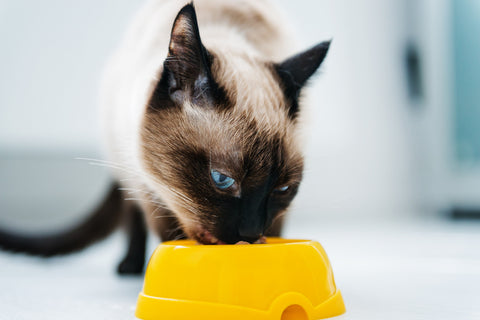
Is your cat eating too fast? Does he throw up after meals? Cat owners everywhere can relate over the weird practices exhibited by our furry friends. While, of course, having to clean up regurgitated, undigested cat food, is not fun for anyone, this little habit can also be dangerous. Excessive intake of food could result in obesity, which brings with it a whole host of other problems. Regular vomiting could also cause stomach and esophageal issues. The best way to find a solution to any problem is to get to the root of it, so, let’s talk about it!
Here are the 7 most common reasons your cat may be eating too fast. Once you narrow it down, we’ll give you a few effective ways to slow his roll.
7. Territorial Eating:
When there are multiple pets in the household, it can sometimes cause one or more of the kitty siblings to eat fast. This is especially true for households with a dominant or alpha cat. The alpha of the group might be hoarding the food which then causes other pets to eat as much as possible while they have the chance.
6. Behavioral Issues:
Not unlike his human counterparts, your cat could be over-eating due to boredom, loneliness, or even depression. When consulting with your veterinarian, be sure to mention any major life changes, new additions to the household, or any other odd behaviors being displayed.
5. A symptom of an Underlying Medical Condition:
Certain medical conditions, such as Diabetes Mellitus and hyperthyroidism, can cause an almost insatiable appetite. If scarfing down his food is not a trait that your cat has always had, it’s time for a vet visit, This needs to include a full exam and complete blood panel.
4. Addiction:
Animals, too, can become addicted to eating. This is actually more common in cats on a wet food diet. Really though, your cat could simply be eating too fast, because, get this, he likes the way the food tastes. Once you have ruled out other causes, a change in food (brand, or adding a dry kibble to the wet food) might be necessary. Sorry, kitty, it’s for your own good!
3. Past Trauma:
If your kitty was saved from an abusive or neglectful environment, he could have very well come with lasting trauma. This can result in a number of different behavioral issues, including over-eating. This is especially true if he previously suffered from malnutrition or starvation in the past.
2. Inefficient Diet:
The actual food that your cat is eating could also be a factor. When fed a low-quality diet, your pet is likely to be deprived of important vitamins and minerals. Cat food that is packed with grains and additives can cause them to eat more. Basically, they’re trying to make up for the nutrients that they are lacking.
1. Parasites:
Many parasites, like tapeworms, attach themselves to the intestines and steal all of the nutrients that your pet is taking in. This can result in your pet not receiving the nutrition he needs. In turn, it may cause him to eat more to make up the difference. If you suspect that your cat has tapeworms, it should be treated immediately. This is important to avoid creating even more serious issues such as anemia.
How to Slow Down their Eating:
Slow-Feed Toys and/or Games: There are more than a few interactive gadgets to help your furball eat at a slower pace. Cat Amazing Classic, our interactive treat puzzle is a catastic option for slowing down eating.

Provide Ample Enrichment: This is perhaps the most important tip – cats, like people, will eat to relieve boredom. Keeping them occupied, and turning food into a game will help slow them down. For an in-depth look at enrichment, grab our free guide: Keeping Kitty Happy: The Ultimate Guide to Indoor Cat Enrichment

Break it Up: If feeding your cat once or twice a day, you should consider breaking up the meal. Try smaller portions, more often, throughout the day.
Automatic Feeders: Automatic cat feeders are a terrific tool. It can help with weight and portion control as well as forcing Fluffy to slow his roll while eating. (Be sure you choose one that has a portion control option!)
Switch it Up: You could also feed your cat from a flat surface as opposed to him eating from a bowl. If his food is spread out on a plate, it will reduce his ability to eat so fast.
Bonus Tip: Try using a muffin tin (which can also inhibit speed-eating)!
Once you have pinpointed what exactly is causing your frisky feline to overeat, formulating a plan of action becomes so much easier. The first step is to have him fully examined by your veterinarian to ensure there isn’t a medical reason. Finally, use all of the tips above at your disposal. Prevention is way better than dealing with any health issues later that can develop as a result.

Hi, try feeding your cats in separate rooms.
Our older cats eats slowly so we wait till he finishes before letting them both roam.
Hope this helps.
My smallest cat came from a hoarding situation. He eats his food quickly so he can eat my older cats food as well. The older cat often goes without so Little guy can eat. Help!!